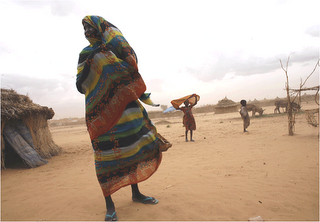"The world's gravest humanitarian crisis."

TAWILA, Sudan, Sept. 8 — They call this place Rwanda.
A year ago it was a collection of straw huts, hastily thrown together in the aftermath of battle, hard by the razor-wire edge of a small African Union peacekeeper base.
Today it is a tangle of sewage-choked lanes snaking among thousands of squalid shacks, an endless sprawl that dwarfs the base at its heart. Pounding rainstorms gather fetid pools that swarm with mosquitoes and flies spreading death in their filthy wake. All but one of the aid groups working here have pulled out.
Many who live here say the camp is named for the Rwandan soldiers based here as monitors of a tattered cease-fire. But the camp’s sheiks say the name has a darker meaning, one that reveals their deepest fears.
“What happened in Rwanda, it will happen here,” said Sheik Abdullah Muhammad Ali, who fled here from a nearby village seeking the safety that he hoped the presence of about 200 African Union peacekeepers would bring. But the Sudanese government has asked the African Union to quit Darfur rather than hand over its mission to the United Nations. “If these soldiers leave,” Sheik Ali said, “we will all be slaughtered.”
Tawila is an apocalyptic postcard from the next and perhaps the grimmest chapter in Darfur’s agony, a preview of the coming cataclysm in the conflict the United Nations has called the world’s gravest humanitarian crisis.
To read the New York Times article by Lydia Polgreen, click here.The following background on the revival of chattel slavery in Sudan is from the Web Site i Abolish.
Sudan's government is a radical regime that terrorizes its own population with brutal slave raids. Amidst civil war and inter-ethnic strife, the Sudanese government has launched a great revival of the country's once virtually-extinct institution of black chattel slavery. The victims: women and children abducted by militiamen during devastating raids.
Sudan means "land of the blacks" in Arabic, and for centuries black Africans were abducted in Sudan as part of the Arabian slave trade. Sudan's borders — drawn by the British during colonial times- encompass Muslim Arabs in the North and black Africans of various faiths in the South. A radical fundamentalist movement pressured the government to impose Sha'ria (Islamic law) on all of Sudan in 1983 — at which time slave raids were reintroduced against black African villages in the South and Nuba Mountains.
A 1989 military coup by the fundamentalist General Omar el-Bashir spurred a dramatic increase in slave raids, which still continue today. Armed by the government, militiamen destroy villages and take their pay in human booty. Grown men are shot, but women and children are the marauders' most prized reward. Forced labor without pay, severe beatings, acute hunger, forced religious and cultural conversion, rape, and ritual female genital mutilation are grim realities for the tens of thousands of children and young mothers now in bondage.
In recent years, the violence has not remained limited to the South. Since 2003, the government-backed Janjaweed Militia has viciously attacked black African Muslims in the Western, Darfur region—destroying villages and farmland, murdering civilians, and abducting women and children in a pattern similar to the slave raids in the South.
The statistics are staggering—violence in the South and West has resulted in over 2 million deaths, 6.6 million internally displaced persons, and 576,000 refugees.
Martin Luther King said that "No one is free until all of us are free."
Bucky Fuller said the same thing in a slightly different way: "We are not going to be able to operate our Spaceship Earth successfully nor for much longer unless we see it as a whole spaceship and our fate as common. It has to be everybody or nobody." (GW)
To find out what you can do to help fight genocide in Sudan, click here.

0 Comments:
Post a Comment
<< Home